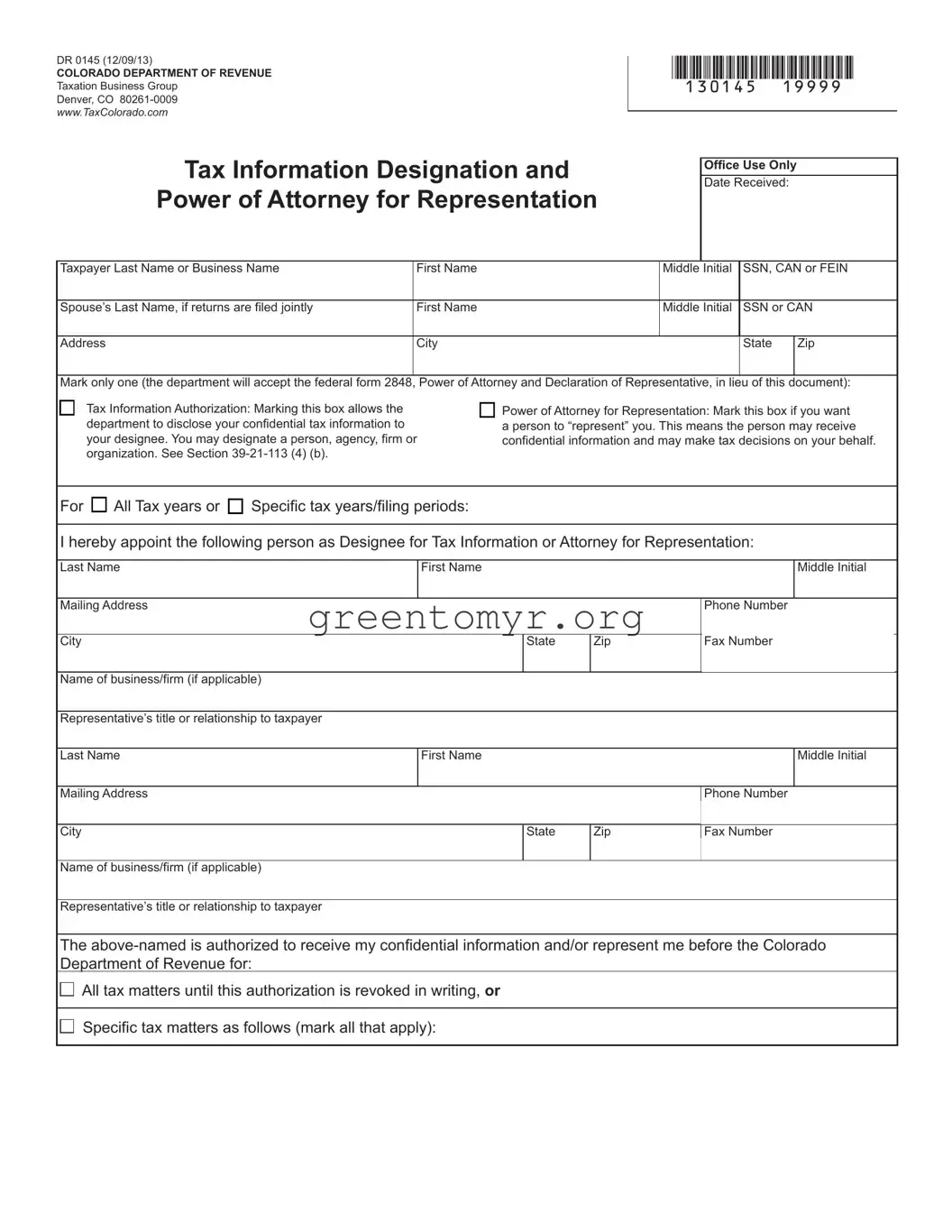|
|
|
|
|
|
*130145==29999* |
|
|
|
|
|
|
|
|
□ |
State Sales Tax |
Period (MM/DD/YY-MM/DD/YY) |
□ |
Partnership Income Tax |
|
Period (MM/DD/YY-MM/DD/YY) |
– |
|
– |
|
|
|
|
|
|
|
|
|
|
|
|
|
|
□ |
State Consumer Use Tax |
Period (MM/DD/YY-MM/DD/YY) |
□ |
Withholding Income Tax |
|
Period (MM/DD/YY-MM/DD/YY) |
– |
|
– |
|
|
|
|
|
|
|
|
|
|
|
|
|
□ |
Individual Income Tax |
Period (MM/DD/YY-MM/DD/YY) |
□ |
All Department- |
|
Period (MM/DD/YY-MM/DD/YY) |
– |
Administered Sales Taxes |
|
– |
|
|
|
|
|
|
|
|
|
|
|
|
|
|
□ Corporate Income Tax |
Period (MM/DD/YY-MM/DD/YY) |
|
All Department- |
|
Period (MM/DD/YY-MM/DD/YY) |
– |
□ |
|
– |
|
Administered Consumer Use Taxes |
|
□ |
Fiduciary Income Tax |
Period (MM/DD/YY-MM/DD/YY) |
□ |
Other tax (specify) |
|
Period (MM/DD/YY-MM/DD/YY) |
– |
|
– |
|
|
|
|
|
|
|
|
|
|
|
|
|
If other, please explain |
|
|
|
|
|
|
Signature of Taxpayer(s)
•I acknowledge the following provision: Actions taken by a Power of Attorney representative are binding, even if the representative is not an attorney. Proceedings cannot later be declared legally defective because the representative was not an attorney.
•Corporate officers, partners, fiduciaries, or other qualified persons signing on behalf of the taxpayer(s):
I am authorized to sign this form on behalf of the entity or person identified above as the taxpayer because:
I am the taxpayer
The taxpayer is a corporation, and I am the corporate officer
The taxpayer is a partnership, and I am a partner
The taxpayer is a trust, and I am the trustee
The taxpayer is a decedent’s estate, and I am the estate administrator
The taxpayer is a receivership, and I am the receiver
Other (if none of the above, then explain what representative capacity you have for the taxpayer)
•If a tax matter concerns a joint return, both spouses must sign if joint representation is requested. Taxpayers filing jointly may authorize separate representatives.
Signature |
Print Name |
|
|
|
Date (MM/DD/YY) |
|
I |
|
|
|
|
|
Title (if applicable) |
|
|
Daytime telephone number |
|
|
I( |
) |
|
|
Spouse Signature (if joint representation) |
Print Name |
|
|
|
Date (MM/DD/YY) |
|
I
Declaration of Representative — I am authorized to represent the taxpayer(s) identified above for the tax matter(s) specified.
Signature |
Date (MM/DD/YY) Title |
I
Note: This authorization form automatically revokes and replaces all earlier tax information designations and/or earlier powers of attorney for representation on file with the Colorado Department of Revenue for the same tax matters and years or periods covered by this form. Attach a copy of any other tax information authorization or power of attorney you want to remain in effect.
If you do not want to revoke a prior authorization, taxpayer sign here |
Spouse signature if returns are filed jointly |
Please complete the following, if known (for routing purposes only). Otherwise, you may mail this document or submit an electronically scanned copy of the document through Revenue Online, www.Colorado.gov/RevenueOnline
Revenue Employee
Division |
Section |
|
|
Telephone Number |
Fax Number |
( |
) |
( |
) |
Send to: Colorado Department of Revenue Denver, CO 80261-0009
If this tax information authorization or power of attorney form is not signed, it will be returned.

This form is used for two purposes:
•Tax information disclosure authorization. You authorize the department to disclose your confidential tax information to another person. This person will not receive original notices we send to you.
•Power of attorney for representation. You authorize another person to represent you and act on your behalf. The person must meet the qualifications listed here. Unless you specify differently, this person will have
full power to do all things you might do, with as much binding effect, including, but not limited to: providing information; preparing, signing, executing, filing, and inspecting returns and reports; and executing statute of limitation extensions and closing agreements.
SSN: Social Security Number
CAN: Colorado Account Number
FEIN: Federal Employer Identification Number
This form is effective on the date signed. Authorization terminates when the department receives written revocation notice or a new form is executed (unless the space provided on the front is initialed indicating that prior forms are still valid). If this tax information designation and power of attorney for representation form is used for taxpayers on a joint return, both the primary taxpayer and spouse must sign this form.
Unless the appointed representative has a fiduciary relationship to the taxpayer (for example, personal representative, trustee, guardian, conservator), an original Notice of Deficiency will be mailed to the taxpayer as required by law. A copy will be provided to the appointed representative when requested.
For corporations, “taxpayer” as used on this form, must be the corporation that is subject to Colorado tax. List fiscal years by year end date.
An individual who prepares and either signs your tax return or who is not required to sign your tax return (by the instructions or by rule), may represent you during an audit of that return. That individual may not represent you for any other purpose unless they meet one of the qualifications listed above.
Generally, declarations for representation in cases appealed beyond the Department of Revenue must be in writing to the local jurisdiction district court. A person recognized by a district court will be recognized as your representative by the department.
Taxpayer Assistance
General tax information
www.TaxColorado.com
Revenue Online account access www.Colorado.gov/RevenueOnline
Telephone
303-238-7378



